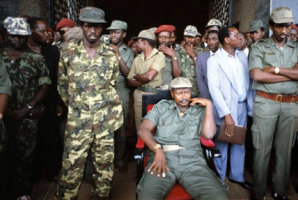Museveni will be remembered for corruption
By Abbey K. Semuwemba
8th Aug 2011: Corruption in Africa is endemic because the leaders we have are not willing to fight it. At least in Ghana, they have started moving a step forward ever since Jerry Rawlings had people who were found guilty of major acts of corruption executed by firing squad in 1983.
Up to now, I don’t know how to interpret Museveni’s Shs770m (about US $300,000) donation to a school in Kigali. Is a poor person supposed to donate food to a neighbour when he cannot feed his own family? That trip alone must have cost Ugandans an arm and a leg. I thought a four day state visit to Rwanda was not necessary; but hey, what do I know?
Museveni’s $300,000 donation on a “suspect project” looks like wasteful expenditure for a leader of a starving country. When we got independence in 1962, Uganda drifted from a bureaucratic administration that emphasized good governance to one that put more emphasis on the sovereignty of politics.
When Obote took over, we ended up with a bureaucratic autocracy that was lacking in accountability, transparency and the rule of law. As a result, corruption became one of the main reasons given by almost all coup plotters from 1970s onwards. Amin listed it as one of the reasons why kicked Obote out. In Sierra Leone, Captain Valentine Strasser also gave it as a reason for the coup. It was the same in Ghana and Mali in 1991.
What has happened in Uganda since the 1990s shows that ‘something is broken’ in the NRM and it needs fixing. The Besigyes (products of NRM) realized that they could not fix it from within and opted out. But the NRM has been using state institutions to make sure that they [Besgyes] fail to ‘fix’ it.
As a result, Africa has ended up with two classes of leaders since the coup era: Benevolent autocrats and kleptocrats. Both are not really absolute dictators because they try to work or try to portray themselves as working within the existing state institutions. There are so many characteristics of these leaders but I will a pick a few to make a point.
Museveni is specifically a kleptocrat: He is fearful of being overthrown and therefore favours policies that benefit him in the short run with costs spread in the future. He can manipulate any state institution for personal gain. For instance, he can spend a lot of money bribing people in an election, like he did in 2010-11 elections, because he believes that with the oil money coming in, this void can be fixed in future.
Characteristic of the typical Kleptocrat
Kleptocrats will also seek a taxation system that efficiently generates revenue, but they are likely to introduce distortions. At the moment, Uganda collects more taxes than at any time since independence but there is very little to show for it because we are led by a wrong man. So we cannot change a system that has gone wrong with a ‘wrong man’ still at the helm of things. This is where I disagree with former presidential candidate Beti Kamya.
Kleptocrats tend to support projects that generate large corrupt payoffs. Thus the leader will endorse projects with little economic justification, propose public projects that could be efficiently carried out in the private sector. If revelations of corruption are likely to destabilize the regime, the Kleptocrat will do everything to make sure that they go away on his own terms.
Just look at the people who were implicated in the Global Fund scandal, the Temangalo sacandal, the CHOGM scandal etc and how their court cases have been handled. It all doesn’t make sense. Some are even continuing to serve as MPs; while others were appointed in Museveni’s new cabinet.
Under Museveni, corruption has become worse. He and his NRM will sadly be remembered for this. Uganda is now a neo-patrimonial state; which basically means a perverse system that awards economic and political benefits to politicians and their followers. This type of corruption negatively affects the development of the country.
For instance, when President Museveni favours Hassan Basajabalaba with “donations” and “bail outs” from Bank of Uganda on a regular basis, the most deserving recipients of such help do not get access to public resources. Most of the corruption in Africa is linked to unethical leadership and bad governance. With Museveni and his men still running the country, corruption is always going to be as massive as it is now because there is lack of political will to stop it.
Did fighter jets’ money fund Museveni’s 2011 campaign?
Another example is that of the fighter jets that were recently bought from a Russian company at a cost of more than $700m. We heard that the government had ordered many jets. But only two jets are in the country as we speak. The total cost of the jets also looks astronomical. It looks like the “buying of jets” was only an official cover for another suspect expenditure.
It is entirely possible that Museveni may have used most of this money to ‘bribe’ people during the elections. Most governments in Africa get these sort of ‘covers’ from the Ministry of Defence or Security because such ministries are often run by their cronies.
A similar thing happened in Kenya in 1989 when the then Kenyan government bought fighter jets from a French firm, rather than a British firm, at twice the British firm had quoted. The reason was that the British firm had refused to pay a kickback to the Kenyan negotiating team.
In both cases, the people bear the cost of corruption. There are a lot of deals like this under the NRM and it is greatly affecting the development of the country. END. Please login to www.ugandacorrespondent.com every Monday to read our top stories and anytime mid-week for our news updates.
![]()


